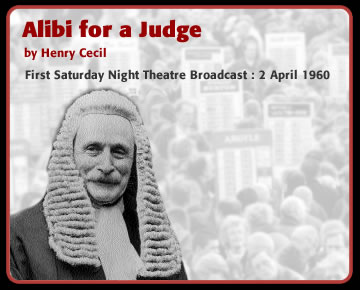Mr Justice Carstairs is a High Court Judge. He is completely incompetent and a chronic worrier to boot. This is perfectly illustrated when he sentences a man to ten years' imprisonment and then immediately doubts his verdict. Taking the unprecedented step of trying to overrule his own judgement he encounters resistance on all sides. Matters get really complicated when, in trying to prove the man's innocence, he becomes convinced of his guilt. He also becomes the target of a blackmailer. Find out how he resolves this dilemma in this is highly amusing and whimsical tale of a man assailed by his own doubts.
Henry Cecil Leon (19 September 1902 – 23 May 1976), who wrote under the pen-names Henry Cecil and Clifford Maxwell, was a judge and a writer of fiction about the British legal system. Being a High Court Judge and a successful authour is certainly a good way to protect your income. He was born near London in 1902 and was called to the Bar in 1923. Later in 1949 he was appointed a County Court Judge, a position he held until 1967. He used these experiences as inspiration for his work. His books are works of great comic genius with unpredictable twists of plot, but are not intended to be realistic or strong on characterization. They typically feature educated and genteel fraudsters and blackmailers who lay ludicrously ingenious plots exploiting loopholes in the legal system. There are several recurring characters, such as the drunken solicitor Mr Tewkesbury and the convoluted and exasperating witness Colonel Brain. He writes well about the judicial process, usually through the eyes of a young barrister but sometimes from the viewpoint of the judge; Daughters in Law contains a memorable snub from a County Court judge to a barrister who is trying to patronise him.
His 1955 novel Brothers in Law was made into a film in 1957 and, later, a television and radio series starring Richard Briers. While at Paramount Pictures, Alfred Hitchcock worked on adapting No Bail for the Judge for the screen several times between 1954 and 1960, and hoped to co-star Audrey Hepburn, Laurence Harvey, and John Williams, but the film was never produced.
He also reviewed the Rowland case in the Celebrated Trials series published by David & Charles in 1975. The 1946 trial of Walter Rowland was for the murder of Olive Balchin, who had been found battered to death on a bomb site on Deansgate, Manchester. A hammer had been found near the body, and the police identified Rowland with three witnesses. He was found guilty and hanged at Strangeways Prison in 1947. He protested his innocence from the dock and afterwards. After the trial, another man confessed to the killing, but his evidence was ignored when the original judgment was reviewed by the Court of Criminal Appeal. Henry Cecil concludes in his book that Rowland was indeed guilty, although Cecil ignores the forensic evidence, or rather the absence of forensic evidence, linking Rowland to the crime scene. His book reveals the many prejudices of the judiciary in the 1970s, including the complete acceptance of police evidence at face value, for example.
|

